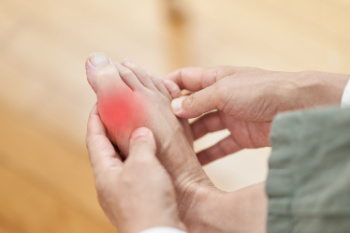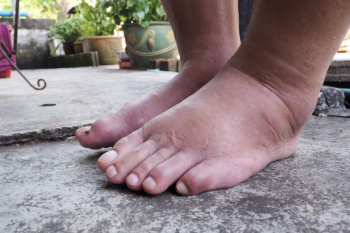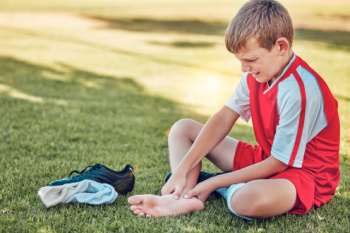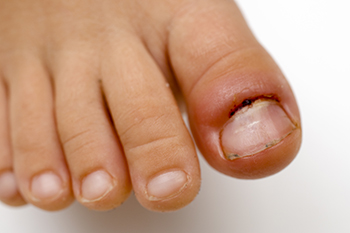
Gout is a type of arthritis that can occur suddenly, often at night, causing severe pain and swelling in the affected joint. It happens when uric acid builds up in the bloodstream, forming crystals that deposit in joints, particularly in the big toe. This can result from consuming too many purine-rich foods like red meat, shellfish, and alcohol, or due to kidney issues that prevent uric acid from being excreted properly. Symptoms include intense joint pain, swelling, redness, and warmth, which can feel like a throbbing or burning sensation. The pain may be so severe that even the weight of a blanket can be unbearable. Gout attacks can last for days and may recur, if left untreated. A podiatrist can help by diagnosing gout through a physical exam, blood tests, or joint fluid analysis. They may recommend lifestyle changes, medications, or specific treatments to relieve pain and prevent future attacks. If you have this condition, it is suggested that you schedule an appointment with a podiatrist for appropriate care.
Gout is a foot condition that requires certain treatment and care. If you are seeking treatment, contact Amir Shalev, DPM from Complete Foot & Ankle Care. Our doctor will treat your foot and ankle needs.
What Is Gout?
Gout is a type of arthritis caused by a buildup of uric acid in the bloodstream. It often develops in the foot, especially the big toe area, although it can manifest in other parts of the body as well. Gout can make walking and standing very painful and is especially common in diabetics and the obese.
People typically get gout because of a poor diet. Genetic predisposition is also a factor. The children of parents who have had gout frequently have a chance of developing it themselves.
Gout can easily be identified by redness and inflammation of the big toe and the surrounding areas of the foot. Other symptoms include extreme fatigue, joint pain, and running high fevers. Sometimes corticosteroid drugs can be prescribed to treat gout, but the best way to combat this disease is to get more exercise and eat a better diet.
If you have any questions please feel free to contact our office located in Las Vegas, NV . We offer the newest diagnostic and treatment technologies for all your foot and ankle needs.

Diabetes affects the body in many ways, and one common issue is swollen feet. High blood sugar levels can damage blood vessels and nerves, leading to poor circulation and fluid retention in the lower extremities. This swelling, known as edema, can cause discomfort and may increase the risk of infections and ulcers. Nerve damage, or neuropathy, can further complicate the issue by reducing sensation, making it difficult to notice injuries or pressure points. Poor circulation slows healing, increasing the likelihood of complications. Managing blood sugar levels, wearing supportive footwear, and elevating the feet can help reduce swelling. If you have diabetes and your feet are noticeably swollen, it is suggested that you are under the care of a podiatrist who can help you to manage this condition.
Diabetic foot care is important in preventing foot ailments such as ulcers. If you are suffering from diabetes or have any other concerns about your feet, contact Amir Shalev, DPM from Complete Foot & Ankle Care. Our doctor can provide the care you need to keep you pain-free and on your feet.
Diabetic Foot Care
Diabetes affects millions of people every year. The condition can damage blood vessels in many parts of the body, especially the feet. Because of this, taking care of your feet is essential if you have diabetes, and having a podiatrist help monitor your foot health is highly recommended.
The Importance of Caring for Your Feet
- Routinely inspect your feet for bruises or sores.
- Wear socks that fit your feet comfortably.
- Wear comfortable shoes that provide adequate support.
Patients with diabetes should have their doctor monitor their blood levels, as blood sugar levels play such a huge role in diabetic care. Monitoring these levels on a regular basis is highly advised.
It is always best to inform your healthcare professional of any concerns you may have regarding your feet, especially for diabetic patients. Early treatment and routine foot examinations are keys to maintaining proper health, especially because severe complications can arise if proper treatment is not applied.
If you have any questions please feel free to contact our office located in Las Vegas, NV . We offer the newest diagnostic and treatment technologies for all your foot and ankle needs.

Child athletes frequently experience foot and ankle injuries due to the physical demands of sports. Activities such as soccer, basketball, and gymnastics place significant stress on these areas, increasing the risk of sprains, fractures, and overuse injuries. Ankle sprains are particularly common, often resulting from sudden changes in direction or missteps. Overuse injuries in child athletes, such as stress fractures and tendon inflammation, can develop when repetitive motions strain the bones and soft tissues without adequate recovery time. Growth plate injuries are another concern, as the developing bones in children are more vulnerable to damage, which may affect long-term growth. Ignoring persistent pain or swelling may lead to chronic issues and a higher risk of re-injury. A podiatrist can evaluate your child’s condition, provide treatment to manage the pain and swelling, and recommend ways to prevent future injuries, such as wearing proper footwear and activity modifications. If your child experiences foot pain after sports activities, it is suggested that you schedule an appointment with a podiatrist for an exam and treatment options.
The health of a child’s feet is vital to their overall well-being. If you have any questions regarding foot health, contact Amir Shalev, DPM of Complete Foot & Ankle Care. Our doctor can provide the care you need to keep you pain-free and on your feet.
Tips for Keeping Children's Feet Healthy
- Make sure their shoes fit properly
- Look for any signs of in-toeing or out-toeing
- Check to see if they have Clubfoot (condition that affects your child’s foot and ankle, twisting the heel and toes inward) which is one of the most common nonmajor birth defects.
- Lightly cover your baby’s feet (Tight covers may keep your baby from moving their feet freely, and could prevent normal development)
- Allow your toddler to go shoeless (Shoes can be restricting for a young child’s foot)
- Cut toenails straight across to avoid ingrown toenails
- Keep your child’s foot clean and dry
- Cover cuts and scrapes. Wash any scratches with soap and water and cover them with a bandage until they’ve healed.
If you have any questions, please feel free to contact our office located in Las Vegas, NV . We offer the newest diagnostic and treatment technologies for all your foot care needs.

A toe infection can cause pain, swelling, redness, and discharge, making daily activities difficult to complete. Common causes of toe infections include fungal infections like athlete’s foot or toenail fungus, bacterial infections from cuts or injuries, and ingrown toenails. Fungal infections thrive in warm, moist environments and can spread through shared surfaces or personal items. Bacterial infections often develop when bacteria enter the skin through small breaks, such as improperly trimmed nails or blisters. People with diabetes or circulation problems are at a higher risk, as they may not feel early symptoms, which allows infections to get worse. Signs of a more serious infection include fever, warmth surrounding the toe, or red streaks moving up the foot. Without treatment, an infection can spread to deeper tissues, increasing the risk of serious complications. A podiatrist can diagnose the cause of your infected toe, clean the affected area, and recommend the appropriate treatment. Antifungal medication, antibiotics, or minor procedures to remove infected tissue are among the options. If you believe your toe has become infected, it is suggested that you schedule an appointment with a podiatrist for an exam, diagnosis, and treatment.
Toe pain can disrupt your daily activities. If you have any concerns, contact Amir Shalev, DPM of Complete Foot & Ankle Care. Our doctor can provide the care you need to keep you pain-free and on your feet.
What Causes Toe Pain?
Most severe toe pain is caused due to a sports injury, trauma from dropping something heavy on the toe, or bumping into something rigid. Other problems can develop over time for various reasons.
Toe pain can be caused by one or more ailments. The most common include:
- Trauma
- Sports injury
- Wearing shoes that are too tight
- Arthritis
- Gout
- Corns and calluses
- Hammertoe
- Bunions
- Blisters
- Ingrown toenails
- Sprains
- Fractures (broken bones)
- Dislocations
When to See a Podiatrist
- Severe pain
- Persistent pain that lasts more than a week
- Signs of infection
- Continued swelling
- Pain that prevents walking
Diagnosis
In many cases the cause of toe pain is obvious, but in others, a podiatrist may want to use more advanced methods to determine the problem. These can range from simple visual inspections and sensation tests to X-rays and MRI scans. Prior medical history, family medical history, and any recent physical traumatic events will all be taken into consideration for a proper diagnosis.
Treatment
Treatments for toe pain and injuries vary and may include shoe inserts, padding, taping, medicines, injections, and in some cases, surgery. If you believe that you have broken a toe, please see a podiatrist as soon as possible.
If you have any questions please feel free to contact our office located in Las Vegas, NV . We offer the newest diagnostic tools and technology to treat your foot and ankle needs.
